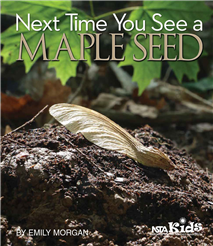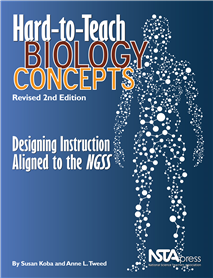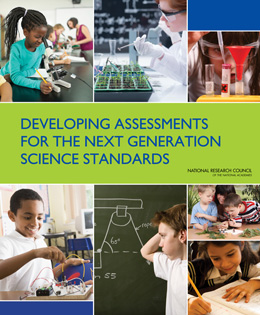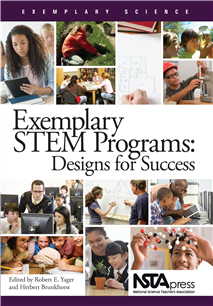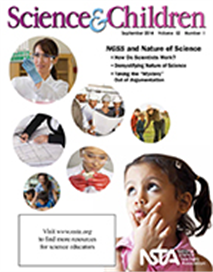All Resources
NSTA Press Book
The NSTA Quick-Reference Guide to the NGSS, Elementary School
Since the release of the first draft of the Next Generation Science Standards (NGSS), NSTA has been at the forefront in promoting the standards and helping science educators become familiar with and learn to navigate this exciting but complex documen...
NSTA Press Book
Hard-to-Teach Biology Concepts, Revised 2nd Edition: Designing Instruction Aligned to the NGSS
“This book does not contain a recipe to follow as you plan and deliver lessons. Nor is it a set of predesigned lessons for use in biology classrooms. Instead, it features both an instructional framework you can use as you plan and sets of research-...
By Susan Koba, Anne Tweed
NSTA Kids
Next Time You See a Maple Seed
Named an Outstanding Science Trade Book for Students K-12! It’s fun to toss maple seeds up in the air and watch them spin down to the ground like nature’s own helicopters. This book prompts inquisitive kids to learn about these marvels of aerial...
eBook
Next Time You See a Maple Seed (e-book)
It’s fun to toss maple seeds up in the air and watch them spin down to the ground like nature’s own helicopters. This book prompts inquisitive kids to learn about these marvels of aerial engineering, including their real name (no, not whirlybird)...
NSTA Press Book
Using Physical Science Gadgets and Gizmos, Grades 3-5: Phenomenon-Based Learning
What student—or teacher—can resist the chance to experiment with Velocity Radar Guns, Running Parachutes, Super Solar Racer Cars, and more? The 30 experiments in Using Physical Science Gadgets and Gizmos, Grades 3–5, let your elementary school ...
By Matthew Bobrowsky, Mikko Korhonen, Jukka Kohtamaki
eBook
“This book does not contain a recipe to follow as you plan and deliver lessons. Nor is it a set of predesigned lessons for use in biology classrooms. Instead, it features both an instructional framework you can use as you plan and sets of research-...
Acquired Book
Developing Assessments for the Next Generation Science Standards
Assessments, understood as tools for tracking what and how well students have learned, play a critical role in the classroom.Developing Assessments for the Next Generation Science Standardsdevelops an approach to science assessment to meet the vision...
eBook
Exemplary STEM Programs: Designs for Success (e-book)
Everybody talks about STEM initiatives, but is anybody doing them effectively? This book’s answer is a resounding yes! It tells the inside stories of 24 science, technology, engineering, and mathematics programs that both connect with the Next Gene...
Journal Article
Fourth-grade students examine animal tracks to explore the nature of science....
Journal Article
Demystifying Nature of Science
Two activities help young children understand nature of science....
Journal Article
Taking the "Mystery" Out of Argumentation
A traditional mystery-powders lesson is modified to emphasize argumentation....
Journal Article
Three, Two, One ... Blast Off!
Third-grade students learn about the nature of science through a rocket engineering challenge....
Journal Article
Integrating the Nature of Science
A lesson on interdependent relationships and ecosystems gets a boost when students learn how they are acting like scientists....
Journal Article
Editor's Note: Learning About the Nature of Science (NOS)
Science and Children’s editor shares thoughts regarding the current issue....
Journal Article
This article shows how NOS is related to the NGSS...
Journal Article
Teaching Through Trade Books: How Do We Know What We Know About the Universe?
This column includes activities inspired by children’s literature. This month’s lessons focus on how our understandings about the universe change as we develop technologies that allow us to gather new evidence....
Journal Article
The Early Years: The Nature of Science in Early Childhood
This column discusses resources and science topics related to students in grades preK to 2. This month’s issue discusses ways to incorporate nature of science into the early childhood classroom....
Journal Article
Formative Assessment Probes: Is It a Theory? Speaking the Language of Science
This column focuses on promoting learning through assessment. This month’s issue focuses on a probe that is designed to find out if students (and teachers) distinguish scientific theories from the common use of the word theory and if they understan...
Journal Article
Science 101: How Do We Use Calculus in Science?
This column provides background science information for elementary teachers. This month’s issue describes the role of calculus in science classes....
Journal Article
Safety First: Feather, Feet, and Fin Safety in the Classroom
This article describes the safety and responsibility issues that come with using animals in the classroom....



